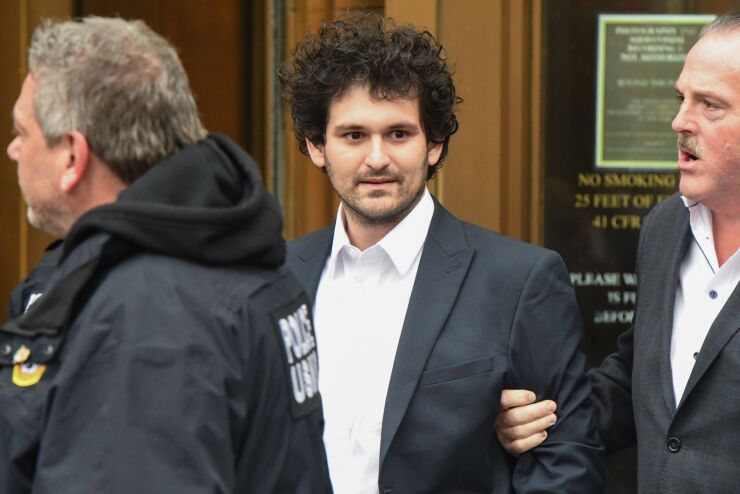The trial of FTX co-founder Sam Bankman-Fried on charges of fraud and money laundering is still in its early days, and has already featured crucial testimony from
At the heart of it all was Bankman-Fried, who witnesses said was well-aware of FTX's financial issues long before its bankruptcy and ensured almost from the start that Alameda Research, its sister trading firm, received special privileges on FTX that contributed to both companies' downfall. Bankman-Fried has denied all the allegations against him.

With former Alameda CEO Caroline Ellison expected to
- Big shortfall: Adam Yedidia, who attended MIT with Bankman-Fried and worked at FTX, testified Thursday that he and Bankman-Fried discussed an $8 billion liability owed to FTX by Alameda as of June 2022, about five months before both companies' implosion. Yedidia, who testified on the condition of immunity, had stumbled on the massive liability while going over FTX's accounting program and brought it up to Bankman-Fried. "Sam said something like, 'We were bulletproof last year. We're not bulletproof this year,'" Yedidia testified.
- Special privileges: FTX co-founder Gary Wang, who knew Bankman-Fried from a high school math camp as well as MIT, went into detail about how Alameda Research was given special privileges that no other FTX customer had. The former insider, who pleaded guilty to criminal fraud charges in December as part of a cooperation deal and faces up to 50 years in prison, said Alameda had a $65 billion credit line on FTX — even as no other customer had a credit line over $1 billion. Wang explained that former FTX head of engineering, Nishad Singh, co-authored a change to software code in 2019 that allowed Alameda to have a negative account balance and borrow money from FTX customers. "The money belonged to customers and the customers did not give us permission to use it for other things," Wang said. Bankman-Fried knew of and even approved of Alameda's immense privileges, while at the same time posting on social media that the firm's account was "just like everyone else's," according to Wang. "I trusted his judgment," Wang said.
- Loss 'loophole': Wang explained that Alameda was also used to absorb FTX's losses, giving an example that he referred to as the "MobileCoin exploit." He said in 2021, a customer took advantage of a "loophole" in FTX's margin system by depositing a small amount of collateral, while taking a large position over a series of several months. When the price of the MOB token dropped and triggered a liquidation at a loss of several hundred million dollars, Bankman-Fried said that the customer's position and collateral should be transferred to Alameda, which would then take the loss.
- No insurance: Wang also testified about issues with FTX's backstop insurance fund, which was supposed to cover losses when a customer's position required liquidation. He said that an FTX web page that claimed to show the value of the backstop insurance was in reality, a fake number.
- Reassurances: Matt Huang, co-founder of crypto venture firm Paradigm, which started investing in FTX in 2019, said during his testimony last week that while he was aware of FTX and Alameda's relationship, he was reassured that Alameda received no special treatment on FTX.
- Alameda shutdown?: In September 2022, Alameda had run up as much as $14 billion in debt to FTX, according to Wang, who noted that FTX and Alameda often used Google Sheets to review finances. Meanwhile, a
Bloomberg News story that published the same month about the close relationship and potential conflicts between FTX and Alameda prompted discussions in chats on the messaging app Signal, in a Bahamas meeting and in Google Docs. Wang said that Bankman-Fried considered shutting down Alameda, but that ultimately, he and Ellison decided that they couldn't do it because it wouldn't be able to repay the losses.
- "Not fine": Problems mounted at FTX when a crypto news site (CoinDesk) published an article in November 2022 that showed much of Alameda Research's balance sheet was made up of FTX's native token, FTT, Wang testified. On Nov. 6, Bankman-Fried's rival, Binance CEO Changpeng "CZ" Zhao, said that his crypto exchange was dumping roughly $530 million of FTT holdings on its books. The move tanked the price of FTT and spurred investors to pull their funds from FTX. Wang said FTX was no longer able to meet withdrawals because it had sent billions of dollars of customer funds to Alameda. He noted that a Nov. 7 tweet from the company suggesting that withdrawals were slow because banks were closed didn't accurately portray what was happening. Wang said statements from Bankman-Fried suggesting everything was fine weren't accurate. "FTX was not fine and assets were not fine," he told the jurors.
After Wang's testimony concludes, Ellison is set to testify next. Considered the





